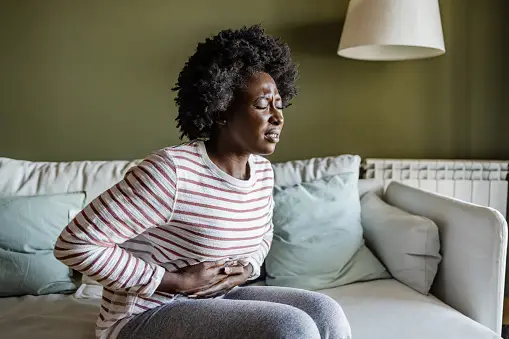Endometriosis—whose symptoms include abdominal pain, fatigue and infertility—is not strange to many women, yet awareness of the disease is painfully low. In Nigeria, an estimated 40% suffer from the disease, which is often dismissed as menstrual cramps.
“I’d faint from the pain every month,” says Grace Adeyemi, an Abuja-based resident who endured endometriosis for nearly ten years. While doctors linked her agony to stress, “others said I was imagining the whole thing,” she adds.
Limited knowledge about Endometriosis
This misdiagnosis about Adeyemi’s condition, sadly, reflects a broader knowledge deficit about endometriosis in Nigeria. A broad majority of patients, according to a 2023 report, typically wait between 7 and 10 years to be correctly diagnosed.
This delay is due to the usual suspects—widespread cultural taboos against menstruation, inadequate diagnostic machinery and limited specialists.
Yetunde Olarenwaju, a gynaecologist at the National Hospital in Abuja, affirms the limited knowledge among general practitioners, noting, “We see so many young women who have seen four or five clinics before they see us.”
Endometriosis, says Olarenwaju, is typically diagnosed through laparoscopic surgery, which many Nigerian public hospitals lack, forcing many patients to turn to self-medication.
Myths have, however, wrought more damage. In a few African societies, pain within a woman’s body is perceived as a natural punishment for a misdeed.
“Some people told me I was cursed,” remembers Ngozi Chukwuma, 29, a schoolteacher. “They said that I must have done something wrong to a god or had an affair with a married man. It took me years to learn that it was an illness.”
Endometriosis occurs when uterine-like tissue forms outside the uterus, causing inflammation and searing pain. Yet many Nigerian women seem to believe that prolonged menstrual discomfort is a test of endurance or maturity.
“When you’re constantly told your pain’s not real, you start to question your own sanity,” remarks Olarenwaju, the gynaecologist. “We’ve had patients break down in tears, feeling they were going crazy. That psychological damage can be worse than the pain itself.”
Women who suffer from endometriosis frequently report depression and anxiety and a growing aloofness from even their loved ones.
Bisi Odubayo, an Abuja-based nurse, explains that “most women who were presented to us with chronic gynecological pain have been waved off somewhere else. They’re not looking for medical intervention; they’re looking for validation.”
Stemming the tide
Several health groups have been leading awareness campaigns in response to this growing misconception. Organisations such as the EndoSurvivors International Foundation (ESIF) and Endo Support Group Nigeria (ESGN) are coming to the rescue of women with medical resources and pushing for institutional change.
The ESIF, particularly, runs educational workshops in universities and hospitals, where it’s taught over 20,000 young women to track early symptoms and access specialist treatment. The organisation also hosts specialised training for doctors to enhance their capacity in minimally invasive gynaecological surgery.
In cities like Lagos and Abuja, fertility and endoscopy centres that specialise in laparoscopic and hysteroscopic services are now emerging.
In a similar vein, public hospitals are establishing reproductive health departments in a bid to explore menstrual disorders. One example is a laparoscopic facility by the Lagos University Teaching Hospital (LUTH) following an increase in government funding.
Implicit to these interventions is technology. A mobile app known as Endometrix enables women to monitor symptoms, quantify pain and chat with vetted specialists.
In addition to boosting access to treatment, Olarenwaju maintains that ending endometriosis in Africa hinges on dispelling longstanding beliefs.
“Girls need to be taught from puberty that bad pain is not acceptable. They need to be given the power to speak up, not endure,” she says.
Adeyemi, who volunteers with an awareness group in Abuja, shares her story to help accelerate awareness about endometriosis. Ngozi, meanwhile, recently began therapy to reclaim her sense of control.
“I don’t want sympathy,” she says. “I want people to understand. I want the next set of girls to understand that pain doesn’t show weakness. Silence does.”
Summary not available at this time.






